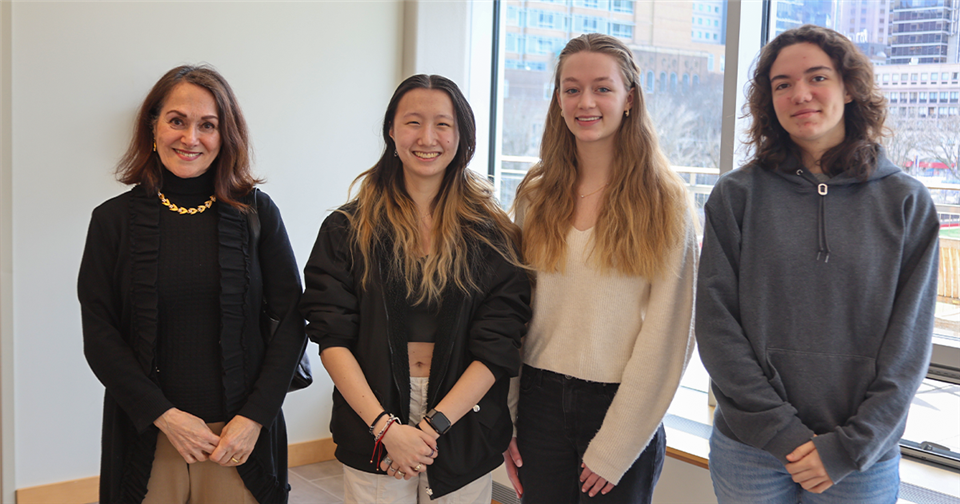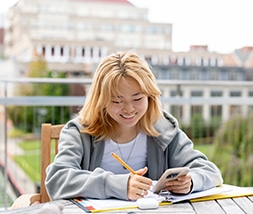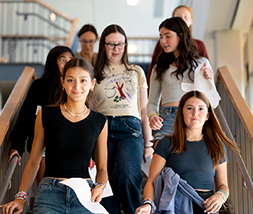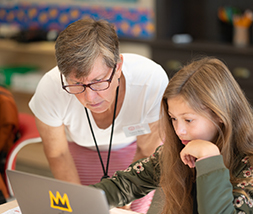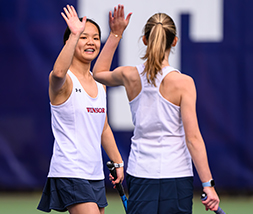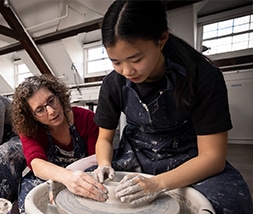Northeastern Professor Visits Winsor for Masterclass on “Iran’s Protesting Women”
February 29, 2024—At a special Upper School meeting this week, Winsor’s Amnesty International Club hosted Professor of Sociology and International Affairs at Northeastern University Valentine Moghadam. While Upper School meetings are normally reserved for Classes V–VIII, Class IV was invited to attend the college-style lecture.
Amnesty International is “a global movement of more than 10 million people in over 150 countries and territories who campaign to end abuses of human rights,” shared club head Karla Sahin ’24. “Our club and the organization we represent focus on educating our community and advocating for global human rights.”
On January 19, 2024, Winsor’s Amnesty International Club hosted Jamnesty, an annual music coffee-house event with performers from Winsor, Belmont Hill, and Roxbury Latin. The event raised over $2,000, which the club donated to Amnesty International. “Throughout the night, we also took the time to educate our community on women’s rights in Iran,” Lucie Rynne ’24 reminded the audience gathered in the David E. and Stacey L. Goel Theater. “We briefly discussed the history of the Women, Life, Freedom movement, and the legacy of Mahsa Amini. You may remember hearing about the movement for women’s rights in Iran in the news back in September of 2022, but since then, our media attention has shifted away from this region and this conversation. Today, we hope to shift your attention back to this movement.”
Professor Moghadam was particularly excited to be at Winsor, as it was her first time addressing high school students. Born in Tehran, Iran, Professor Moghadam has held positions as the senior research fellow and coordinator of the Research Program on Women and Development with the United Nations University World Institute for Development Economics Research and as chief of the section on Gender Equality and Development for UNESCO’s Human Rights Division. The author of countless journal articles, five books, co-author of another, and editor of an additional nine, Professor Moghadam’s publications include her book Modernizing Women: Gender and Social Change in the Middle East and journal articles such as “Women in Iranian Kurdistan: Patriarchy and the Quest for Empowerment” and “Gender Regimes in the Middle East and North Africa: The Power of Feminist Movements.”
Currently engaged in a study of violence against women in Iran, in law and practice, with a focus on Iranian Kurdistan, Professor Moghadam taught a masterclass at Winsor on the recent history of women leading protests in Iran.
Using the 1979 protests that aligned with International Women’s Day as a starting point, Professor Moghadam traced the history of Iran’s hardliner and reformer regimes to illustrate the cumulative effect of economic, religious, and social grievances that ultimately led to recent protests around the death of Mahsa Amini—a 22-year-old Iranian woman who was arrested in Tehran for opposing mandatory hijab and later died in police custody, sparking a wave of protests.
From the baby boomer generation in the 1970s to Generation Z today, Professor Moghadam noted that students have been at the forefront of these modern-day protests and each generation has picked up the torch. Many participants in the October-November 2022 protests were high school students who visibly wore their hair long or cut their hair publicly in defiance of compulsory hijab.
During the Q&A, a student asked, “What does the future look like?” Professor Moghadam was hopeful, explaining the gap that exists between the Iranian government and the increasing secularization of society, noting the lack of call to prayer over loudspeakers, sparsely attended mosques, and students going to school without hijab.
In her opinion, “The days of the mullah are numbered, but we don’t know when that time will come. Change has come about through revolution, or very serious, consistent, reforms. I’m hoping for very serious, consistent, reforms. But the sanctions have to end first,” said Professor Moghadam, who noted in her talk that increased international sanctions have always coincided with increased restrictions on women in Iran.
“We’re so thankful to have Professor Moghadam with us today and to hear the insights and expertise she has to offer. We hope you all take this as an opportunity to learn and expand your understanding of this movement and the world around you,” shared club heads Karla and Lucie.
Professor Moghadam spent the rest of the morning on campus discussing her research and the research process with students taking Literature of the Middle East and History of the Middle East.
The student leaders of Winsor’s Amnesty International Club led the effort to bring Professor Moghadam to campus, and were supported by English Faculty and Amnesty International Club Advisor Laura Krier.
